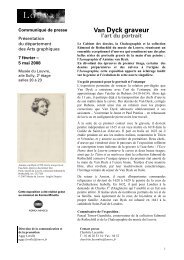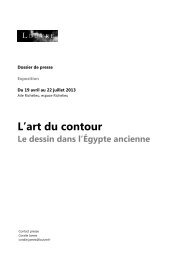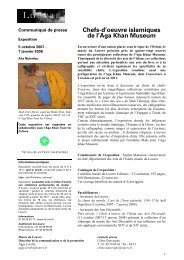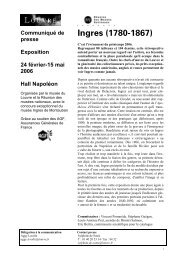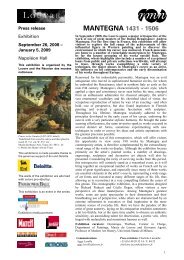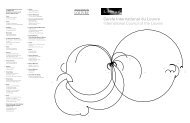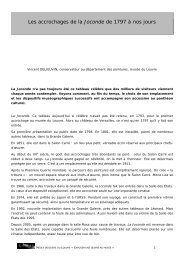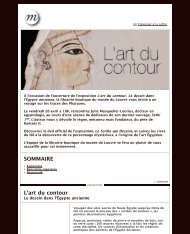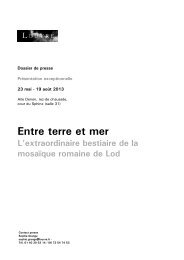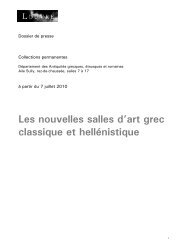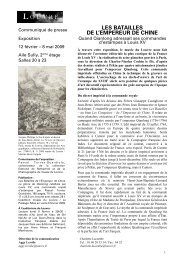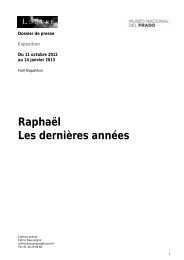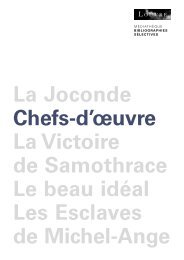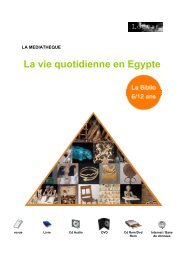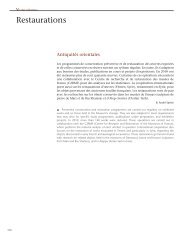In the Auditorium - Musée du Louvre
In the Auditorium - Musée du Louvre
In the Auditorium - Musée du Louvre
You also want an ePaper? Increase the reach of your titles
YUMPU automatically turns print PDFs into web optimized ePapers that Google loves.
<strong>In</strong> <strong>the</strong> <strong>Auditorium</strong><br />
Georges Lavaudant<br />
Peter Wispelwey © Benjamin Ealovega<br />
STAGE PLAY: PAWANA<br />
Friday, November 11 and Saturday, November 12 at 8 p.m.<br />
Sunday, November 13 at 4 p.m.<br />
Text by J.-M. G. Le Clézio. Directed by Georges Lavaudant.<br />
With Jérôme Derre and Philippe Morier-Genoud.<br />
An event co-pro<strong>du</strong>ced by <strong>the</strong> <strong>Louvre</strong> and LG Théâtre – Georges<br />
Lavaudant. The starting point of Pawana (which means “whale” in <strong>the</strong><br />
Nattick <strong>In</strong>dian language) is <strong>the</strong> story of a bloody hunt by <strong>the</strong> whaler<br />
Charles Melville Scammon. <strong>In</strong> <strong>the</strong> second half of <strong>the</strong> nineteenth<br />
century, this real-life indivi<strong>du</strong>al, whose character approaches <strong>the</strong><br />
legendary proportions of Herman Melville’s Captain Ahab, discovers<br />
a lagoon in Mexico, one of <strong>the</strong> last breeding refuges for gray whales.<br />
He decides to exterminate <strong>the</strong>m. The narrative weaves toge<strong>the</strong>r, in <strong>the</strong><br />
form of two monologues, <strong>the</strong> memories of <strong>the</strong> past and remorse of <strong>the</strong><br />
captain and his young cabin boy.<br />
More than twenty years after it was first staged in Mexico, in a<br />
Spanish-language pro<strong>du</strong>ction, <strong>the</strong> director Georges Lavaudant relishes<br />
<strong>the</strong> opportunity <strong>the</strong> return to this text he had commissioned from J.-M.<br />
G. Le Clézio, a dramatization of <strong>the</strong> author’s own short story. For this<br />
restaging at <strong>the</strong> <strong>Auditorium</strong> <strong>du</strong> <strong>Louvre</strong>, he has called upon <strong>the</strong> two<br />
actors who created <strong>the</strong>ir roles in <strong>the</strong> French-language version of<br />
Pawana, presented to great acclaim at <strong>the</strong> Avignon Festival in 1992.<br />
CONCERTS<br />
Friday, November 4 at 8 p.m.<br />
Mehdi Haddab, oud and Jean‐François Zygel, piano / Improvisation<br />
The improvisational pianist Jean-François Zygel joins <strong>the</strong> oudist<br />
Mehdi Haddab for an exploration of traditional <strong>the</strong>mes and <strong>the</strong><br />
classical repertoire.<br />
At <strong>the</strong> request of J.-M. G. Le Clézio, who dreamed up <strong>the</strong> idea of<br />
pairing <strong>the</strong> oud, an instrument he adores, with ano<strong>the</strong>r instrument,<br />
Mehdi Haddab and Jean-François Zygel welcome <strong>the</strong> opportunity to<br />
pursue <strong>the</strong> improvisational approach that will be <strong>the</strong> guiding principle<br />
of this special evening performance. Acoustic and electric instruments<br />
share <strong>the</strong> stage at this concert bringing toge<strong>the</strong>r two leading lights of<br />
<strong>the</strong> genre.<br />
“It’s funny. When you improvise, you need to be very attentive to<br />
what you’re doing, but also outside yourself, almost as if you had a<br />
split personality. You need to guide, lead and build while playing, and<br />
at <strong>the</strong> same time let go, allow something to emerge between <strong>the</strong><br />
superficial and <strong>the</strong> deeply rooted self.<br />
For me, music was certainly born of improvisation. That’s where <strong>the</strong><br />
musical discourse first saw <strong>the</strong> light of day, later to be codified on<br />
paper. Jazz musicians have made this <strong>the</strong> secret of <strong>the</strong>ir art. As<br />
classical musicians, it is our <strong>du</strong>ty to join <strong>the</strong>m, to recall that <strong>the</strong> secrets<br />
of all music may be traced back to improvisation.”<br />
Jean-François Zygel<br />
Friday, November 25 at 8 p.m.<br />
Peter Wispelway, cello J. S. Bach<br />
Six Suites for Unaccompanied Cello, BWV 1007–1012<br />
Concert with two intermissions.<br />
MUSIC ON FILM<br />
Boléro(s)<br />
Sunday, November 20 at 3 p.m.<br />
The celebrated work by Maurice Ravel is at <strong>the</strong> heart of J.-M. G. Le<br />
Clézio’s latest novel, Ritournelle de la faim. This event features a<br />
dramatic reading of an unpublished text on Boléro, accompanied by<br />
<strong>the</strong> screenings of an excerpt from Michel Follin’s 2008 documentary<br />
La Passion Boléro as well as a complete performance of Boléro under<br />
<strong>the</strong> baton of Sergiu Celibadache, who has a particularly trancein<strong>du</strong>cing<br />
approach to this work.



